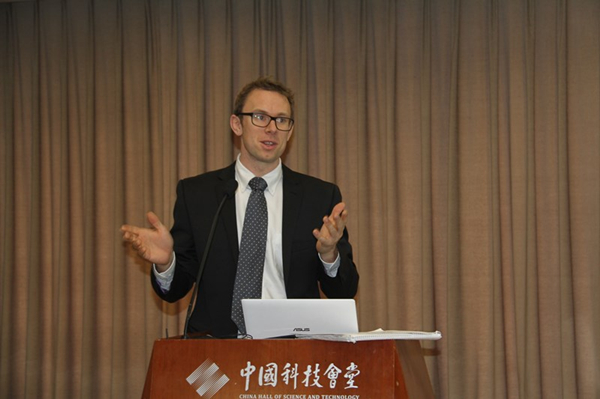Strategic ways to reduce fossil fuel subsidies
 0 Comment(s)
0 Comment(s) Print
Print E-mail China.org.cn, April 22, 2016
E-mail China.org.cn, April 22, 2016
 |
|
Richard Bridle, a researcher from IISD-GSI, talks about the definition of fossil fuel subsidies and introduces the two common valuation approaches to the audience. [Chinagate.cn/Photo by Liu Hui] |
A conference focusing on fossil fuel subsidies was held in Beijing on April 19, highlighting a variety of issues that illustrate the immediate and future challenges of energy consumption and sustainable development, Chinagate.cn reported.
The seminar gathered many international and domestic experts on climate change and energy, aiming to make global efforts in eliminating fossil fuel subsidies and unlocking the potential of clean energy.
For decades, fossil-fuel subsidies have encouraged wasteful consumption and harmful emissions, which are obviously detrimental to sustainable development. In September 2009, the G-20 nations agreed to "rationalize and phase out, over the medium term, inefficient fossil fuel subsidies." And then, the Global Subsidies Initiative (GSI) research uncovered the characteristics of fossil-fuel subsidies and lessons for reform.
Richard Bridle, a project researcher who supports IISD's (International Institute for Sustainable Development) Geneva-based GSI, said that subsidies are often used as an unjustified payment to an inefficient industry. To know what the fossil fuel subsidies really were, one should first have a clear mind on what subsidies are in a legal and economic context.
"As for the legal term, 'subsidy' refers to a direct transfer of funds or liabilities, government revenue foregone due to tax breaks, regulated prices and some other forms of support. At the economic level, the imbalance between the true social cost of production and consumption, on the one hand, and the price on the market, on the other, could reflect what a subsidy is," added Richard.
He suggested two estimation methodologies——the price gap approach and the inventory approach, both of which are used by international organizations and OECD countries for measuring subsidies. "The former quantifies the gap between free-market reference prices and the prices charged to consumers, while the latter aims to construct an inventory of government actions benefiting production and consumption of fossil fuels."
Feng Shengbo, Deputy Director of the Energy System Analysis Center, Energy Research Institute, NDRC, explained that the legal and economic definitions of fossil fuel subsidies exerted a great effect on what kind of possible reform mechanisms China could take.
At present, China and the U.S., as members of the G-20, are finishing their joint peer reviews of the inefficient fossil fuel subsidies in each country, and Germany and Mexico are currently carrying out a similar review. "China has prepared a detailed blueprint on energy reform. More reform strategies covered power system reform, rationalized fiscal and taxation system, and a market-oriented pricing mechanism regarding natural gas, crude oil and coal," continued Feng.
"Although there is no one-size-fits-all strategy for fossil-fuel subsidy reform, there are a set of planning stages that are generic, along with many common issues, challenges and potential solutions. Therefore, a flexible approach adapted to country specifics will better help its economy and energy reform in the long term," said Feng.
"Increasing renewable energy sources and optimizing the structure of final energy consumption might be another ways to lower subsidies," advocated Liu Qiang, a researcher with the Institute of Quantitative & Technical Economics (IQTE) at the Chinese Academy of Social Sciences (CASS).
Yang Fuqiang, Senior Advisor at the Natural Resources Defense Council, stated that fossil fuel subsidies reduce the costs of fossil fuels and thereby impair the cost competitiveness of renewable energy. He urged that a proactive approach should be taken, taking into account the environmental, health and climate impact of fossil fuels, thus allowing renewable energy to compete on a fair basis.






Go to Forum >>0 Comment(s)